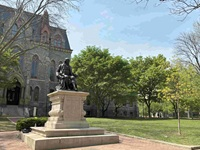Speaker
Description
ALFE2 is an ATLAS Liquid Argon Calorimeter (LAr) front-end ASIC designed for the High Luminosity-Large Hadron Collider (HL-LHC) upgrade. ALFE2 comprises four channels of Pre-Amplifiers (PAs) and CR-(RC)2 shapers (SH) with adjustable input impedance. Each shaper has a Low Gain (LG) output and a High Gain (HG) output. Both outputs can be simultaneously read out to cover a 16-bit dynamic range with optimum resolution. ALFE2 includes a CR-RC shaper for a layer-sum output with a switchable gain of 1 or 3. ALFE2 is manufactured in a TSMC 130 nm CMOS process.
ALFE2 is characterized by using an ALFE2 test board, a calibration pulser, and a Front-End Test Board (FETB). The ALFE2 test board hosts a BGA test socket and RF relays. The RF relays select one of two typical detector loads for tests with different input impedance configurations of 25 Ω or 50 Ω. The calibration pulse generator injects current calibration signals into the test board. The FETB is a high-speed data-acquisition platform based on a System-on-Module (SOM) Mercury+ XU1 from Enclustra. The SOM has a Xilinx Zynq UltraScale+ Multi-Processor System on a Chip (MPSoC) running Peta-Linux. The FETB uses two 8-channel 16-bit state-of-the-art ADCs ADS52J65 from Texas Instruments.
The ALFE2 test results demonstrate that ALFE2 fulfills or greatly exceeds all specifications for the ATLAS LAr Calorimeter. The measured Equivalent Noise Currents (ENIs) are 170 nA and 50 nA for 25 Ω and 50 Ω input impedances, respectively, about half of the specifications. The measured Integral Non-Linearities (INLs) of the HG and LG outputs are below 0.1% (specification 0.2%) and 0.5% (specification 5% in the full dynamic range), respectively. Excellent uniformity is measured with a yield of 97% and a large margin observed across 900 ASICs.
ALFE2 is tested for radiation tolerance. Thirty ALFE2 samples from 3 wafer lots (three extra reference samples without irradiation) were irradiated in Cobalt-60 gamma-rays from 2.2 kGy to 9.5 kGy. During the test, the changes in the baseline and the gain were within ±0.5% and ±0.1%, respectively. The power consumption, peaking time, INL, and ENI were stable. Four ALFE2 samples were tested with 226 MeV protons. The cross-section of the Single-Event Upsets (SEUs) is about 3.56E-15 cm2/bit at a 95% confidence level. The extrapolated error rate for the whole HL-LHC ATLAS LAr calorimeter is less than 7.3 errors per day at the 95% confidence level. The test results indicate that ALFE2 meets the radiation-tolerance requirements.
About 80,000 ALFE2 chips have been produced. Quality control tests are being performed at Brookhaven National Laboratory (BNL) and IJCLab. A custom-designed robotic test system was developed at IJCLab and duplicated at BNL. The preliminary analysis of about 5,000 chips that have been tested indicates an agreement between the two test systems. The commissioning of the robotic test system is being finalized, and the production QC tests will get started soon at both BNL and IJCLab.
